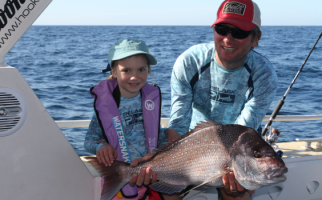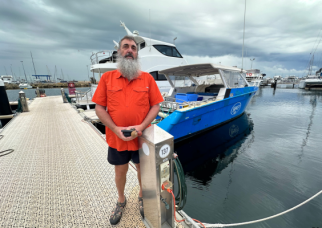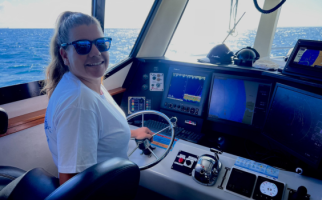Following Government fishery management changes, dozens of charter operators are facing the prospect of losing their businesses in the coming months with fishers aboard their vessels no longer able to fish for demersal fish like dhufish and pink snapper in the West Coast Bioregion (WCB – from Kalbarri down to Augusta) from 1 July.
This will significantly reduce opportunities for people with no boats or small boats to safely experience the joy of fishing for quality bottom fish in the WCB on board a charter boat or on “live-aboard” charter trips to locations like the Abrolhos.
Each year, 72,000 members of the WA community go on charter fishing trips, helping the sector employ 831 people while generating $110 million in economic activity. The WCB accounts for 40 per cent of all charter fishing trips and west coast demersal fish are the lifeblood of charter fishing in this area.
Charter fishing is responsible for only 12 per cent of total demersal catches in the WCB. Like the recreational fishing sector though, charter operators have been told to slash their catches. A tag system has been introduced for the charter sector whereby operators are issued with a limited number of tags by DPIRD with one tag allowing the capture of one demersal fish.
This week, the 99 charter fishing licence holders in the WCB learnt how many tags they were each going to get and, therefore, the total amount of demersal fish fishers on board their boats can catch in a year. In a bitter blow, 78 of the 99 licence holders have been told they will receive ZERO tags, destroying the value of their licence and meaning that in less than four weeks they face the real prospect of going out of business.
For the 21 licence holders who did receive tags, they are looking at a 73 per cent reduction in their allowable catch, a significantly bigger cut than the 59 per cent recreational fishers and the 12 per cent commercial fishers must cut their demersal catches by.
The 78 licence holders who were not allocated any tags were told they didn’t meet the allocation criteria approved by the Minister. These criteria were solely focused on catch history and based on catching at least 355 fish in three of the last five years, effectively penalising small operators focused on providing great fishing experiences rather than catching large amounts of fish.
This allocation model will leave some popular coastal towns like Dongara, Port Denison and many others without any charter fishing opportunities for locals and tourists and has left 78 families facing an unsure future. Unlike for commercial fishers, the Government has not offered a voluntary scheme to buy back charter licences providing a dignified and manageable exit from the fishery. Instead, the Government is offering those that did get tags up to $20,000 in grants and those that didn’t get any tags $5,000.

A clearly broken process
“To offer $5,000 is cold comfort when licence values have likely just fallen by ten times that amount,” said Recfishwest Operations Manager Leyland Campbell. “The tag allocation process completely fails to factor in the valuable service provided by the charter sector, getting the most from each fish and doing what’s right and fair.”
“It’s clearly broken – while the Government has told charter businesses to diversify, it is not realistic or reasonable to expect charter operations to completely change their business model in just four weeks. With the inevitable cancellations of customer booking, many family businesses will not survive. The Minister should go back to the drawing board and give the charter sector a fair-go.”
Marine Tourism WA President Matt Howard also attacked the Government’s decision.
“The charter sector has demonstrated excellent economic and social use of the fish they catch generating significantly more economic activity and employing more people from a relatively small number of fish than other sectors do from ten times as many fish. The Minister has never provided a reasonable explanation as to why 6,000 demersal tags is an appropriate amount for a sector that generates such significant social and economic value.”
Speaking on 6PR, DPIRD’s Aquatic Resource Director Nathan Harrison, whose department has overseen the changes, said the west coast demersal commercial licence buyback scheme may free up more fish to be allocated to the charter sector – but not for several months.
Listen to Nathan Harrison’s recent radio interview with 6PR here.
“[The buyback scheme] will provide an opportunity at the end of the year to see how much of the commercial entitlement has been surrendered,” said Nathan. “It will be voluntary, so we don’t know, but that will then provide an opportunity to Government to see how these savings are best utilised and if any of that will flow onto the charter sector.”
The end of the year will be too late, though, for many charter operators, said Leyland.
“Once these charter businesses close down, there will be no coming back for them,” said Leyland. “It makes complete sense for the Government to hold off on this decision for six months until we see how much more fish may be available to be allocated to the charter and recreational sectors, following the outcome of the commercial licence buy-back scheme. Surely, the Government can wait before making the call that will shut down dozens of family businesses?”
Smaller operators being squeezed out
Few have done more for the protection of demersal fish than Al Bevan, who has operated Shikari Charters out of Perth since 1996.
Al is an active member of the WA fishing community and has assisted with important fisheries research for DPIRD for decades. This included work on barotrauma of demersal fish and testing of the release weight, a concept conceived by Al and Gary Lilly which has saved countless thousands of demersal fish. He also served on the Recfishwest Board from 2001-2007. In addition, Al pioneered the Samson fish fishery in Perth and has been a fishing safety ambassador for a Government-funded fishing safety campaign.
Al purposefully aims to have a low impact on fish stocks, catering for families and smaller groups of between five-seven fishers. He has also built up a steady overseas client list who visit WA purely for the safe and exciting fishing experiences Al provides.
“I thought I was doing the right thing with sustainability and following the Department’s guidelines and slogan ‘fish for the future’ – but it now looks like Shikari has no future,” said Al.
“There is absolutely no fairness in the Ministers’ decision – I’ve tried to give back throughout my entire fishing career, but I feel like I’m being discriminated against because I’m focused on maximizing fishing experiences and getting the most value from each fish rather than simply cramming lots of people on a boat and catching lots of fish.”

Al said his colleagues in the charter sector had received the news of being allocated zero tags with “absolute horror” and are dreading the arrival of July.
Leyland said, “As a stalwart of the charter fishing industry who has done more to protect demersal fish than nearly anyone else, it is beyond belief that Al has not been allocated any tags. This clearly highlights the flaws in the allocation model.”
Al and his wife are seriously concerned about the viability of the business no longer being able to take clients out to fish for pink snapper and dhufish. “I’ve got no idea what I’ll do. Financially, I’ve only got enough money in the business accounts to pay the bills for a few months, and from there I really don’t know. And I don’t owe as much as some of these bigger boats, they will be sweating buckets.
“I have international clients scheduled for July who I will now have call and cancel. These clients would have spent a week in Perth spending thousands of dollars on food, accommodation and fishing gear just to catch one good fish and now they will go elsewhere. The value each fish creates should have been a consideration when deciding who receives a tag, not just the volume of fish caught.”

Penalised for having a family
Another Charter operator who was not allocated any tags is Kristin McCarthy, owner of Seaestar Charters.
Kristin is the only female charter operation owner and master in the WCB – her business employs a full-time skipper, three full-time deckhands, two casual fish guides, a casual bus driver, a full-time engineer/mechanic, an admin assistant and a part-time truck driver – all of whom now have the prospect of losing their jobs hanging over their head.
Kristin was highly critical of the requirement to demonstrate catches in three of the last five years not only because two of those years were affected by COVID, but also because it discriminates against her for having a family.
“I would like to know how is this equitable as a straight across the board process, when it does not allow for operators to show why in some periods, they had lower numbers of catches despite being a full-time operator. For example, in 2020 I had a baby, and, in this period, I limited my fishing for medical reasons and ended up shutting down some of it while I had my child.
“Our fishing represents the majority of our income and we are booked out to 2026, with clients that have already paid. The cash flow crisis this causes will be the end. One would think that in trying to achieve fish stock recovery those that offer different experiences and sustainable fishing models would be of the up most importance and should have got some allowance.”

Providing a fishing experience for all
Another charter operator allocated zero tags was Damien Billi from Big Stoinka Marine Adventures.
Damien’s charter journey was inspired by his autistic daughter who loves fishing. Operating in the South-West, Damien ’s boat Reel Therapy has been specially modified to accommodate wheelchairs and carers and offers smaller charters for people with special needs who are not comfortable with big crowds.
“There is one little boy who comes out fishing probably three to four times a year and his mother says that experience settles him for months,” said Damien “This is the sort of positive difference I want to make. I don’t want to catch lots of fish, I just want a viable business that allows me to make a real difference for those that need it most.”

Providing a sustainable experience
Yet another charter operator to not be allocated any tags is Ocean Addiction Charters – the only charter business based in Dongara/Port Denison. Kate and Dan took the plunge and started a business their town has been needing and wanting for so long. Their 8m boat can take a maximum of six people, posing no threat to fish stocks.
“Our business has satisfied the Australian Tourism Accreditation Standard and has sustainable tourism accreditation, however, we are not being given the opportunity to demonstrate how sustainable we are, even though we are the ONLY fishing charter in the area.”
People should not be penalised for starting a family, providing people of all abilities the opportunity to fish from a boat or maximising the value of each fish. These are things we should be celebrating. A six-month delay won’t impact on stock sustainability and it may just save dozens of family businesses from shutting down.